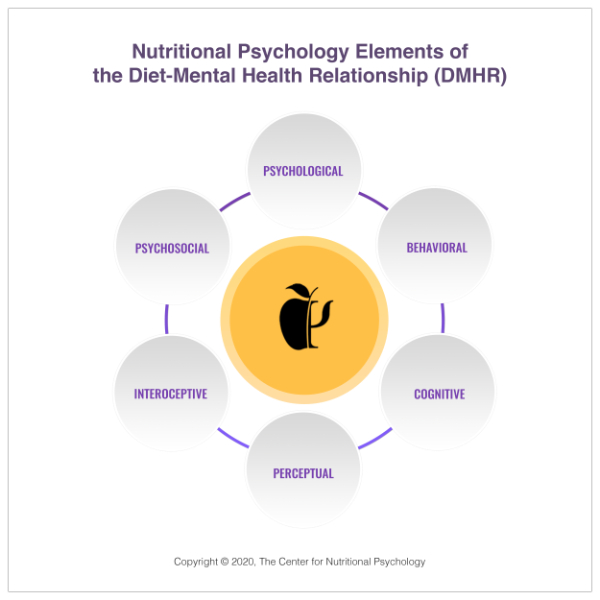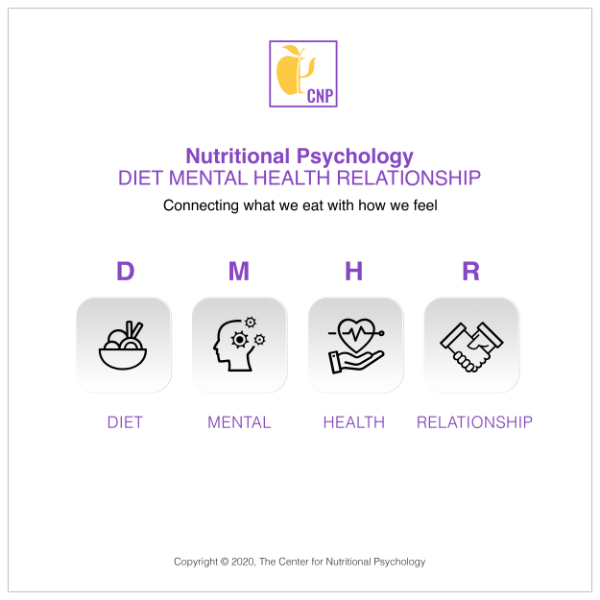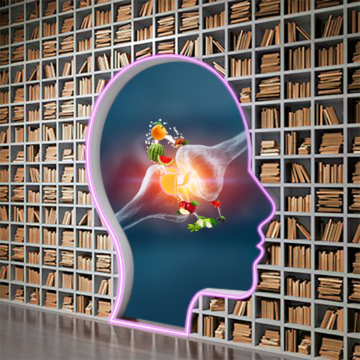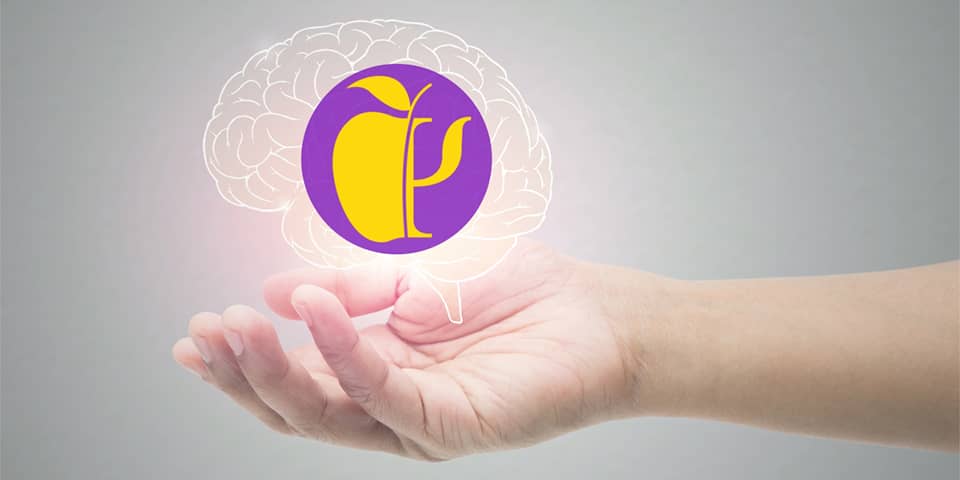A Guide to the Field of Nutritional Psychology: Education, Salary, and More
To see a more updated version of this article, visit here. Note: This guide was written by the developer of the field of Nutritional Psychology, and reviewed by The Center for Nutritional Psychology (the founding organization of Nutritional Psychology), with the purpose of providing individuals with accurate information reflecting the state of the field. Nutritional Psychology was first defined in 2005, taught in university courses in 2008, and The Center for Nutritional Psychology was founded later in 2015 to foster NP’s growth and set the foundation for the field. Due to the source of the information provided in this article, it is considered an accurate reflection of the history, development, and direction of the field of Nutritional Psychology.
What is Nutritional Psychology?
NP is the area of study examining how dietary intake patterns affect mood, behavior, and mental health. Nutritional Psychology examines the psychological, behavioral, cognitive, perceptual, interoceptive (sensory), and psychosocial changes we experience in relation to our dietary intake patterns.
Each Nutritional Psychology element is defined here in more detail:
Diet and Psychological element: The relationship between our dietary-nutrient intake patterns and our psychological moods, emotions and affect (e.g., resilience, flourishing, creativity, negativity).
Diet and Behavioral element: The behaviors, reactions, and choices in which we engage that result from thoughts and emotions influenced by our dietary intake and food environment (e.g., increased reactive behavior or changed dietary behavior patterns).
Diet and Perceptual element: Our interpretation of food-related information stemming from our society, familial, and cultural dietary environment (what foods we are exposed to and how that influences our choices).
Diet and Interoceptive element: The internal physiological sensations we experience in response to our dietary intake patterns (discomfort, pain, energy, fatigue, craving, and wanting).
Diet and Cognitive element: The relationship between dietary-nutrient intake and our cognitive functions and capacity, including memory, attention, learning, and appetite control.
Diet and Psychosocial element: Examining the role that family, culture, community, society, and socioeconomic status play in relationship to our dietary-nutrient intake patterns.
All mental health professionals can benefit from understanding the elements of Nutritional Psychology, and when taken together, these elements form conceptualization in the Diet Mental Health Relationship.
How can I become a “Nutritional Psychologist”?
The formal title of “Nutritional Psychologist” does not yet exist. The first academic training in Nutritional Psychology resided in the John F. Kennedy University in the Continuing Education department from 2008 through 2020. This program provided academic training to hundreds of mental health professionals, nutritionists and dietitians, students, nurses, and counselors in the field of Nutritional Psychology. Those completing the program are trained in providing psycho-educational tools that assist clients in understanding of the diet-mental health relationship (DMDHR). The next-generation curriculum in NP is in development and will be available through The Center for Nutritional Psychology in 2021.
What is the scope of practice for those trained in Nutritional Psychology?
The intended scope of practice for Nutritional Psychology is dependent on the accompanying certification or license of the practitioner (Nutritionist, LCSW, LPCC, MD, Licensed Psychologist, etc.). It is a subset of information and tools designed to deepen the awareness and effectiveness through a better understanding of the DMHR.
Nutritional Psychology provides education, rather than intervention, treatment, or diagnosis. Training and certification in Nutritional Psychology do not provide professionals with the ability to give dietary advice or intervention if they do not already have a license to do so. If one does not have a state-sanctioned license, then the person must work in conjunction with professionals whose scope of practice includes providing nutritional intervention to affect health outcomes.
Those who received formal education and training in Nutritional Psychology, and who can provide education within their scope of practice, may provide educational information on how diet affects mental health, and use NP psycho-educational ‘tools’ to increase awareness of the effects of diet on psychological, cognitive, behavioral, perceptual, interoceptive and psychosocial functioning.
How much do Nutritional Psychologists make?
No salary data for jobs in Nutritional Psychology currently exists. Rather, the psycho-educational tools within Nutritional Psychology serve as an adjunct to previously established mental healthcare methods. Nutritional Psychology provides an additional, and increasingly important tool for professionals to incorporate that helps their clients be better able to achieve their goals, which in turn, can increase the demand for their services, which can (as does any specialty) result in increased services offerings and generated revenue.
Where can I get a degree in Nutritional Psychology?
There is currently no degree program leading to an undergraduate or graduate degree in Nutritional Psychology. The first university-based curriculum in Nutritional Psychology began at John F. Kennedy University from 2008-2020 and was accredited for Continuing Education credits by the American Psychological Association (APA), The California Board of Behavioral Sciences (BBS), and the California Board of Registered Nursing (BRN). The Center for Nutritional Psychology is working to develop a university-level curriculum in Nutritional Psychology that will be available in 2021-2022.
Where can I find education in the field of Nutritional Psychology?
The Center for Nutritional Psychology (CNP) is working to develop the field of Nutritional Psychology by consolidating research, developing an educational curriculum that informs learners of the appropriate methods, concepts, and tools, publishing the first textbook in Nutritional Psychology, setting practice guidelines and standards for certification and licensure in Nutritional Psychology.
Isn’t there currently a Certificate in Nutritional Psychology available for mental health professionals?
Yes, however, the current certificate program in Nutritional Psychology at JFKU is being ‘taught out’, which means the authors of the program have decided to phase it out although it currently has students enrolled. These students will be allowed to complete the program, which remains accredited until they have completed the program. No new students can be enrolled in the JFKU Certificate in NP. CNP is developing a new curriculum to replace this program, which will be available through CNP sometime in early 2021.
Can I obtain a license in Nutritional Psychology?
There is currently no licensing or certifying organization that provides formal credentialing leading to the title of “Nutritional Psychologist”. The John F. Kennedy Certificate in Nutritional Psychology provided formalized education in Nutritional Psychology along with the scope of practice guidelines, but this program is currently being replaced by the next-generation curriculum in Nutritional Psychology available through The Center for Nutritional Psychology (CNP) in 2021-2022.
Aren’t all Mental Health Professionals trained in Nutritional Psychology?
Psychologists and mental health professionals already address the psychological, cognitive, psychosocial, and behavioral knowledge that contributes to positive mental health, but the current model is not considering the Diet-Mental Health Relationship (DMHR) as a contributor to mental health issues.
Conversely, dietitians and nutritionists already address the dietary knowledge that contributes to positive dietary intake and practices. But formal training in the DMHR is not included for those in these fields.
The field of Nutritional Psychology is developing in response to the growing need to equip mental health professionals and nutritionists alike with knowledge of how dietary patterns interact with psychological, cognitive, behavioral, perceptual (interoceptive), and psychosocial functioning to impact both physical and mental health.
Does a professional with Nutritional Psychology skills provide dietary or mental health treatment and/or intervention?
Nutritional Psychology training does not qualify professionals to write nutrition-focused treatment plans or implement specific nutritional interventions. Nutritional Psychology provides professionals with psycho-educational tools and information designed to increase client awareness of how dietary factors can influence their mental health outcomes.
Who should get involved in Nutritional Psychology?
Students in high school and college, licensed professionals, and anyone interested in understanding more about the Diet Mental Health Relationship (DMHR). Typical backgrounds of interested people include psychology, counseling, marriage and family therapy, dietetics, health coaching, nutrition, nursing, and other health-related professions.
Does Nutritional Psychology give me the ability to diagnose or treat mental health problems?
No. Nutritional Psychology does not provide intervention or diagnosis. Rather, it provides psycho-educational tools that engage individuals in understanding the relationship between their dietary intake patterns and their mood, behavior, and mental health.
Is there a difference between the fields of Nutritional Psychiatry and Nutritional Psychology?
While the research informing these two fields at times overlap, the fields of Nutritional Psychology and Nutritional Psychiatry are distinct.
The innovative and emerging field of Nutritional Psychiatry is generally concerned with researching the connection between diet and mental health, including possible clinical intervention (diagnosis and treatment) in patients who suffer from psychiatric disorders including depression and anxiety. This field has been instrumental in leading the way forward in the Diet-Mental Health Relationship.
Nutritional Psychology is focused on the development of methodology, is applied, and includes research informing the following areas:
Diet and…
- Psychological functioning
- Mood (affect)
- Behavior
- Cognition
- Interoception/sensory
- Perception
- Performance
- Psychosocial
- Brain Function
Any aspect of the relationship between daily dietary intake patterns and their effects on the “Diet Mental Health Relationship” (DMHR) form the basis of Nutritional Psychology and the exploration of the ways in which diet is a positive or negative contributor to psychological functioning.
Is Nutritional Psychology different from Health Psychology?
Nutritional Psychology is distinct from Health Psychology. Nutritional Psychology examines the psychological, behavioral, cognitive, perceptual, interoceptive, and psychosocial factors that occur in relationship to human dietary intake patterns. NP is aligned with principles of integrative health, and the newly emerging transformational approach to health and wellbeing is referred to as ‘Whole Health’. Whole health empowers and equips people to take charge of their physical, mental, and spiritual well-being, and live their lives to the fullest.
Health psychology examines how biological, social, and psychological factors influence health and illness. Health psychologists use psychological science to promote health, prevent illness and improve health care systems. These fields have developed independently from each other though no doubt can benefit from one another.
Is there evidence to support the field of Nutritional Psychology?
There is a growing body of research demonstrating the link between dietary intake and the psychological, behavioral, cognitive, perceptual, interoceptive, and psychosocial aspects of mental health. The Center for Nutritional Psychology (CNP) consolidates this research into three different research libraries:
Nutritional Psychology uses evidence-based research to inform and guide the development of the field, and research substantiates the process of providing education/psycho-education designed to help people understand and implement dietary changes. The specific NP tools, methods, and concepts developed thus far have not yet been validated through research.
What are the Educational Requirements for a Career in Nutritional Psychology?
There are currently no educational requirements for a career in NP because there is no official title, license, or degree associated with this field. In order to make good use of the information and tools of NP, we recommend pursuing:
– A graduate-level degree in psychology, counseling, nutrition, or health science, or
– A four-year degree program consisting of electives, core study courses relating to nutrition, psychology, counseling, social work, or mental health;
– Formal education in Nutritional Psychology (available through CNP in 2021-2022).
The following areas of disciplines would help:
Psychology
Counseling
Health Studies
Health Coaching
Nutrition
Nutrition Education or consulting
Dietetics
Social Work
School counselor
Wellness coaching
Substance abuse Counselor
Can Nutritional Psychology be used to cure mental disorders?
Nutritional Psychology is designed to be complimentary and an addition to standard mental health interventions and treatments. For individuals who possess an appropriate license to diagnose and treat mental disorders, NP can provide tools to assist in the treatment. This information and tools from NP can provide a piece of the puzzle for supporting mental health, but is never to be used as a substitute for psychiatric, therapeutic, or medical interventions.
What recommendations do you have regarding incorporating Nutritional Psychology into one’s practice?
Professionals incorporating Nutritional Psychology into their practice must have:
- Formal training in NP (available through CNP in 2021), which includes an understanding of the relationship between dietary and nutrient intake on all aspects of psychological, behavioral, cognitive, perceptual, interoceptive, and psychosocial functioning;
- Advanced knowledge commonly found in a Master’s degree education or higher in psychology, social science, or the health science that includes advanced courses in psychology, along with electives in anatomy and physiology;
- Formal education in nutrition in the form of certification or license from a credentialed program;
- Demonstrated competency in how NP education can be incorporated into their work in a manner that is consistent with their profession’s scope of practice. They must also demonstrate awareness of competencies that extend beyond their profession’s scope of practice and determine when a referral for a psychological or nutritional diagnosis, intervention, or treatment is necessary;
The courses will be suitable for nutritionists and dieticians who seek additional training in mental health from accredited institutions, as well as psychology-minded practitioners requiring coaching on implementing nutritional techniques.
What Does the Future Hold for Nutritional Psychology?
All areas of specialty that can benefit from Nutritional Psychology training are experiencing projected rates of employment growth faster than average, including jobs as nutritionists and dietitians, psychologists:
For nutritionists and dietitians, The BLS (Bureau of Labor Statistics) expects the field to grow by 11% by 2028. The BLS attributes this growth to “the role of food in preventing and treating diseases, such as diabetes”. This is also undoubtedly to address the most recent NHANES findings on obesity in the U.S. adult population (42.4%) (NHANES is a cross-sectional survey designed to monitor the health and nutritional status of the civilian non-institutionalized U.S. population). Dietitians and nutritionists will be needed to provide care for patients in improving their overall health.
Additionally, the Bureau of Labor Statistics indicates that those close to retirement age are demanding more nutritional services. Assisted living facilities, hospitals, nursing homes, and private clinics are expected to add more positions in this field. This need is consistent with research connecting diet with age-related brain disorders.
The employment of psychologists is projected to grow 14 percent from 2018 to 2028, much faster than the average for all occupations. Job prospects should be best for those who have a doctoral degree in an applied specialty.
Employment of marriage and family therapists is projected to grow 22 percent from 2018 to 2028, much faster than the average for all occupations. Growth is expected due to the increasing use of teams for treatment, in which these therapists work with other counselors to address patients’ needs.
Employment of substance abuse, behavioral disorder, and mental health counselors is projected to grow 22 percent from 2018 to 2028, much faster than the average for all occupations. Employment growth is expected as people continue to seek addiction and mental health counseling.
A recent study published in The Lancet estimates that “one in five deaths globally — equivalent to 11 million deaths — are associated with poor diet, and that diet contributes to a range of chronic diseases in people around the world”. And that “the urgent need for coordinated global efforts to improve the quality of human diet” is needed, and that “given the complexity of dietary behaviors and the wide range of influences on diet, improving diet requires the active collaboration of a variety of actors throughout the food system, along with policies targeting multiple sectors of the food system (Lancet 2019).”
Future Education and Training Benefits in Nutritional Psychology
Collectively, these projected job statistics along with the rise in chronic diet-related and mental-health-related conditions, indicate the added knowledge professionals gain from education and training in Nutritional Psychology could quickly highlight their job skills in an increasingly competitive field, and may fast-track career progression.
While both the nutrition and mental health fields have existed independently for many years, nutrition and mental health are only recently beginning to be combined. The demand for nutritional psychology services is likely to increase as individuals become more aware of and interested in the connection between diet and mental health. This is particularly as research validates the link between diet and mental health.
Research is demonstrating that diet is playing an increasingly important role in the mental health of individuals and societies around the globe. The development of the field of Nutritional Psychology provides mental health and nutrition professionals with a much-needed structure through which to address mental health issues.
Visit The Center for Nutritional Psychology (CNP) to keep current with what’s happening in the field of Nutritional Psychology.
References:
- GBD 2017 Diet Collaborators. Health effects of dietary risks in 195 countries, 1990–2017: a systematic analysis for the Global Burden of Disease Study 2017. The Lancet, April 3, 2019; DOI: 10.1016/S0140-6736(19)30041-8




 1. NP Elements Diagram
1. NP Elements Diagram








